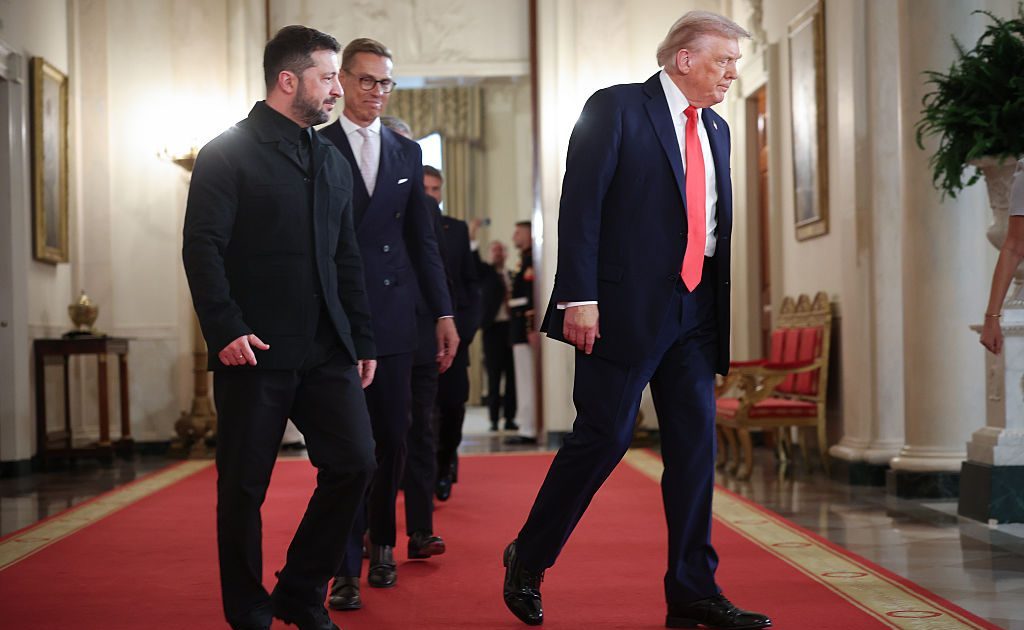Fresh from his Alaska summit with Vladimir Putin, Donald Trump welcomed Volodymyr Zelensky and top European leaders to the White House today. The US President is straining for a Ukraine peace deal, but Russian advances are accelerating while Kyiv’s overstretched forces fight to hold the line.
The Alaska meeting, though symbolically notable, yielded little beyond a restatement of Moscow’s hard terms: Putin insists Ukraine must surrender eastern territory in exchange for peace. That demand appears to have nudged Trump away from the narrower aim of a ceasefire toward the riskier pursuit of a comprehensive peace settlement.
At the White House, Zelensky reiterated his refusal to concede territory. The Ukrainian leader, however, surely knows that he has little choice at this point but to exchange land for peace. Kyiv is unable to retake the territory it has lost, and the longer the war continues, the more Ukraine’s forces will be weakened and the more territory will be put at risk.
What Zelensky hopes to gain from Trump — perhaps in exchange for eventual territorial concessions — are “security guarantees” for Ukraine against future Russian aggression. It has been all but officially acknowledged that Nato’s pledge to bring Ukraine into the alliance will not be fulfilled. But even security guarantees outside of an Article 5 commitment are both unworkable and overly risky.
For one, such “guarantees” are hollow as a deterrent, as the US and Europe have already shown that Ukraine is not a significant enough strategic interest to fight Russia directly and risk nuclear escalation. Yet even a phoney guarantee can carry dangerous consequences. Geography and the balance of power dictate that Ukraine must mix deterrence with reassurance to manage its larger neighbour. But if it is under the illusion that the US will back them in a future conflict, it may well act more recklessly or intransigently toward its more powerful neighbour than it would if it was independently responsible for its own security.
This dynamic makes it harder to sustain peace between Ukraine and Russia in the future and makes new crises more likely. In turn, it would put Washington under renewed reputational pressure to directly intervene to shore up its supposed “guarantees”.
Unfortunately, Trump has been willing to entertain the notion of security guarantees for Ukraine by the US or its Nato allies. During today’s meeting, Trump said that Europe would be “a first line of defence” for Ukraine’s post-war security, but that the US would “help them out”. Over the weekend, Trump’s envoy Steve Witkoff went further by suggesting the US was willing to offer Ukraine “Article 5-like protections”.
The Trump administration has also argued that its mineral deal with Kyiv amounts to a form of security guarantee, since it embeds new American interests in the country. Moscow, unsurprisingly, issued a sharp response, insisting that it would reject outright the presence of any Nato forces on Ukrainian soil.
Trump is unlikely to secure a deal between Russia and Ukraine, but his ongoing efforts may still damage US interests. Russia holds an advantage on the battlefield that will only increase with time, and thus is under far less pressure to end the war. While Ukrainian public opinion has swung dramatically in favour of negotiating an end to the fighting, Zelensky still finds himself unable to make concessions that have become all but inevitable.
The best option for the US at this point would be to walk away from the Ukraine war altogether. However, Trump’s desire for a Nobel Prize and his reluctance to look weak towards Russia have precluded that option for the moment. If, in pursuit of a deal, he offers Ukraine binding security guarantees, the US risks entangling itself in a conflict it has no vital interest in winning. What looks like statesmanship in the short term could, in time, be remembered as a costly miscalculation for both America and Ukraine.











Join the discussion
Join like minded readers that support our journalism by becoming a paid subscriber
To join the discussion in the comments, become a paid subscriber.
Join like minded readers that support our journalism, read unlimited articles and enjoy other subscriber-only benefits.
Subscribe